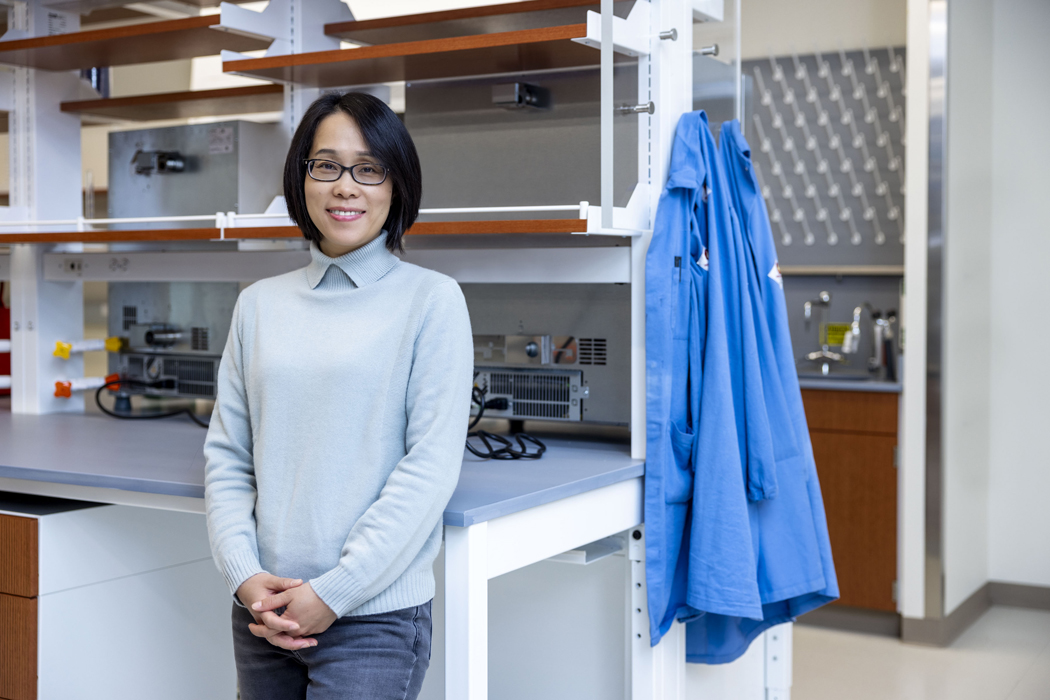Harvesting energy from CO2
Supported by a grant of nearly $400,000 from the United States Department of Energy, Schiller Institute for Integrated Science and Society Professor of Renewable Energy and Sustainability Jier Huang will continue her work designing an organic framework to launch a sunlight-powered catalyst that will harvest energy from carbon dioxide.
The capture and conversion of CO2 into useful chemical fuels driven by solar energy represents one of the best solutions to resolve growing energy concerns. While researchers are exploring many strategies, photocatalytic CO2 reduction is perhaps most attractive due to its simplicity and economy of the input energy source.
Huang, who holds a joint appointment as an associate professor in the Chemistry Department, is developing a unique set of hybrid covalent organic framework (COF) photocatalysts capable of absorbing and manipulating light and equipped with a molecular catalyst that can consume CO2 and convert it to energy.
“I am grateful to the Department of Energy for continuing to fund my work,” said Huang, who joined BC after nearly 10 years at Marquette University. “I have been in this field of solar energy conversion since I was a graduate student. Throughout my career, I became interested in these porous materials as catalysts for energy conversion. That is what our group has been doing for six or seven years.”
Huang and her lab are pursuing the most critical challenge in this area: designing photocatalytic architecture that can effectively pair the tasks of harvesting electrons and initiating an efficient chemical reaction from abundant sources of CO2.
“It is CO2 conversion: using sunlight to convert carbon dioxide to fuels,” said Huang. “It has been seen as a critical element of zero-emissions policy. You remove carbon from the atmosphere and create usable products. The process is driven by sunlight, so it is a renewable and sustainable process.”
Huang will use spectroscopy—a scientific high-speed photographic process—to examine the factors that can control the photocatalysts. In addition to examining the photocatalytic performance, the project will look at selectivity and catalytic pathways and how they correlate with the properties and relationships between structure and function of the hybrid COF catalysts.

Jier Huang (Caitilin Cunningham)
“The new materials we have developed, which we call 2D covalent organic frameworks, is a porous material that gives us more surface area and allows the reagents to move throughout the catalyst. Each empty space is expected to run a reaction. We create a lattice of molecules out of organic materials.”
By using two organic molecules to create the frameworks, their structural flexibility allows for molecular adjustments, or fine tuning, to improve the chemical reaction, said Huang.
While there are no specific targets for the photocatalysts’ performance, researchers aim to provide new solutions to help reach international goals for greenhouse gas reduction, Huang said.
“It may sound like it is far away from application, but that is what we do,” said Huang. “We work toward a goal to make it possible. That is why I was so happy to join BC and the Schiller Institute for Integrated Science and Society. We are working on all of these issues: health, the environment, and energy. We are trying to work together to make this happen.”
As the third Schiller faculty hire, Huang joined Institute Professor of Climate Science and Society Yi Ming and Institute Professor of Global Sustainability Hanqin Tian as the institute’s inaugural faculty members. The Schiller Institute opened in 2021 to enhance multidisciplinary, collaborative research processes to address critical societal issues in the areas of energy, health, and the environment. Named in honor of Boston College Trustee Phil Schiller ’82 and his wife, Kim Gassett-Schiller, through a multi-year lead gift totaling $25 million, the institute is housed in the University’s new science building at 245 Beacon Street.
“I am excited to be here at BC and the Schiller Institute to work with people with complementary experience,” she said. “It feels like by working and collaborating with people here we can make a difference globally. So that is very exciting.”
“I look forward to collaborating with colleagues at BC, or at other area universities since there are so many here. Those are some of the things I’m looking forward to doing,” she added.
Last semester, Huang, Ming, and Tian co-taught the course Exploring the Climate-Energy-Sustainability-Policy Nexus for a general student audience. She is currently teaching two courses in chemistry. Information about Huang’s work is available at the Huang Research Group website.
